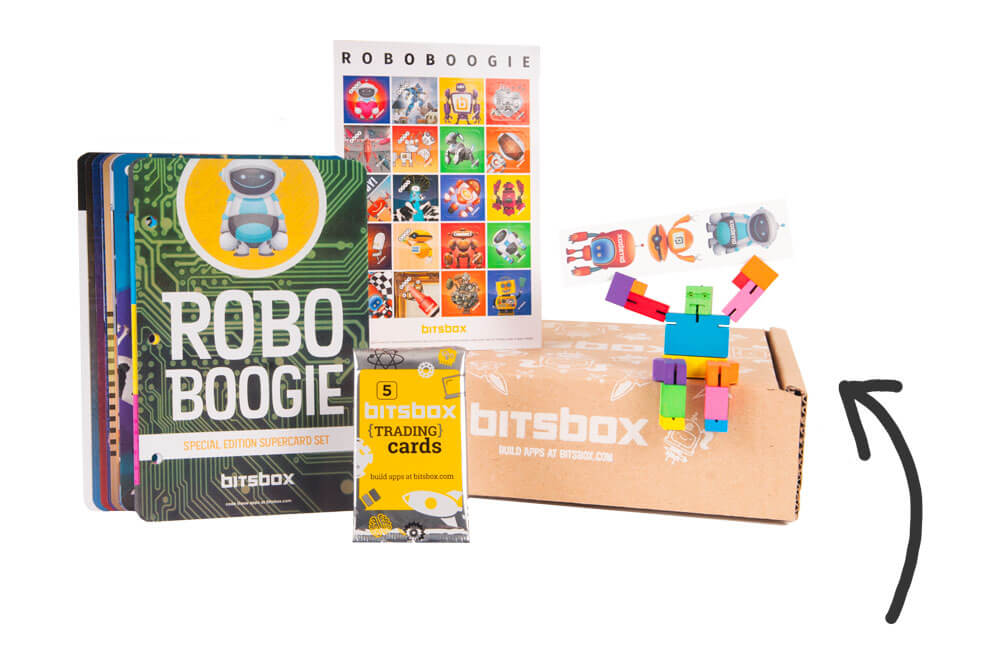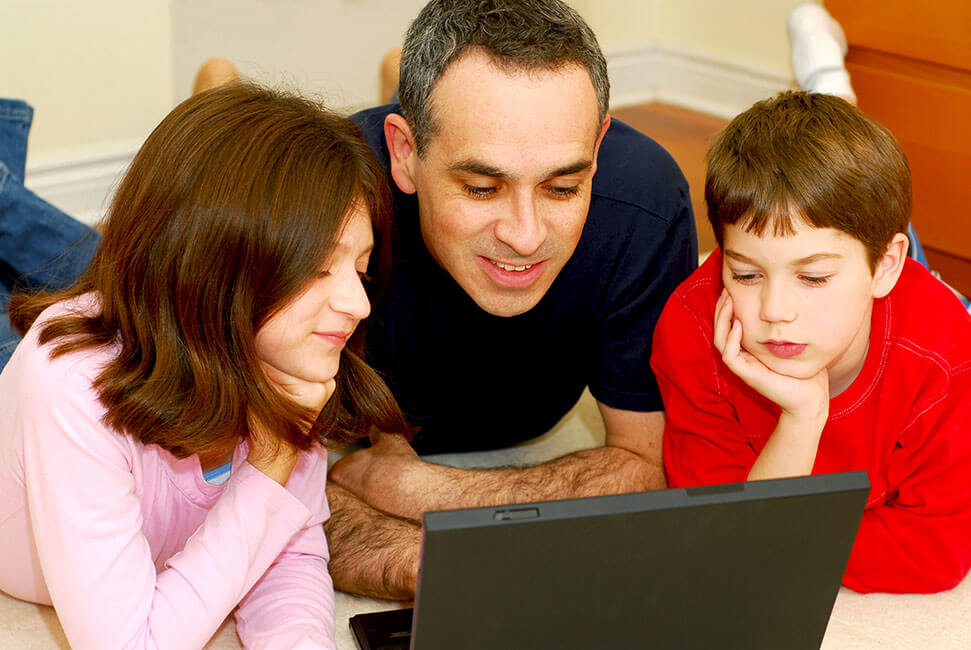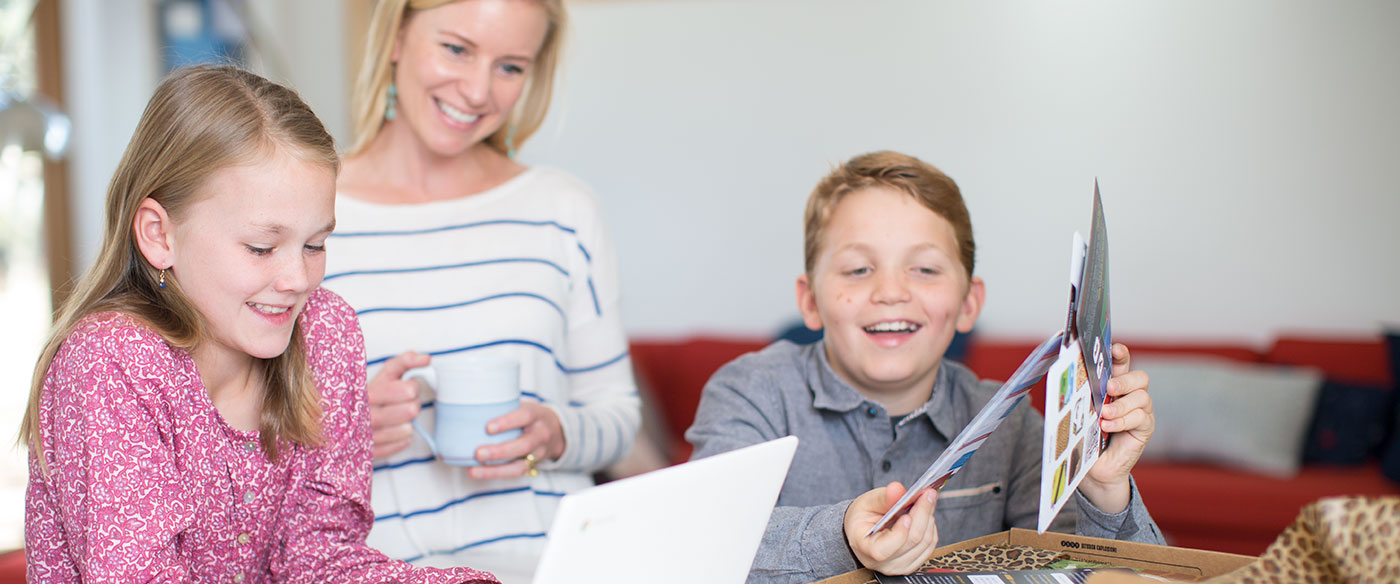Learning to code is like music, dance, writing, and swimming: All these skills are important to know at least a little bit about, and the more kids know, the more opportunities will come their way. However, the hardest thing about teaching kids to code is getting them to stick with it. So what helps kids stay interested long enough to learn how to code?
My daughter, Audrey, started learning to code on Bitsbox when she was seven years old. Since then, I've learned a lot about keeping her motivated. In the following tips, my advice revolves around Bitsbox projects, because we're a Bitsbox family, but you can apply these principles to any coding tools for kids.
1. Encourage your kids to practice coding
Computer code is a language, and like any language, learning to code requires repetition. Coding just 20 minutes a month can make a huge difference in a kid's retention.
Some kids will get into coding and practice every day, but other kids won't. If you have a Bitsbox subscription, motivating your kids to practice coding is easy, because new projects come in the mail every month. Also, Bitsbox is designed to help kids learn how to code on their own — which is a pleasant surprise to many parents.
"I have to say that I am absolutely amazed by what my 8 and 10 year olds have learned so far. By the second app they copied, they were able to easily modify the given lines of code and have been experimenting with adding many of their own lines of code, increasing in complexity as they go. They are so motivated by even the simplest app. I've had them explain to their dad what each line of code does, and they really get it! Thank you!” — Anonymous review
If your kids use a programming tool other than Bitsbox, schedule a reminder to prompt your kids to work on a project once every four weekends. You and your kids can work on a new project each month or work on a larger, ongoing project.
2. Offer kids immediate rewards for coding
My daughter is one of those kids who isn't naturally drawn to programming. She loves to code after she gets started, but given the choice between coding, painting, dancing, or playing with our dogs, she'll rarely pick coding. I've found that sweetening the pot usually encourages her to play with code.

The Roboboogie box came with a fun shape-shifting robot. My daughter loved it.
The full Bitsbox subscription comes with a toy, and that's the reward I use. When the box arrives, I let her see what the toy is, but I don't let her play with it until she codes at least one app project of her choice. Because Bitsbox comes with over a dozen projects to choose from every month, she always finds something she wants to do right away. Twenty minutes later, she's made an app, and I'm a happy dad.
3. Offer kids long-term rewards for coding practice
We've heard from a handful of BItsbox parents who've created a "gold star chart" with a long-term goal and a bigger reward at the end. For some kids, this reward motivates them to keep coding apps.
Make a paper chart, hang it on the wall, and keep track of how many apps your kids build using gold stars or Bitsbox stickers. Pick a big reward (such as a trip to a favorite restaurant, a STEM toy they really want, or a bump in allowance) and let your kid code at their own pace. Hopefully, they'll dig in and learn that procrastination is way less fun than finishing a goal ahead of schedule.
4. Code with your kids
Coding as a team is a super fun way to spend time with your child. Like woodworking or crafting or making art, programming is creative and rewarding. And nothing motivates kids like spending time with you.

Coding with your kids is a lot of fun, and you just might learn something.
If you're a programmer yourself, you can use the coding time to help your kids learn more about what's actually happening in the Bitsbox projects. I like to challenge my daughter with little problems, like "How can we keep the vehicle from moving off the screen?" or "Now that the app works, what should we add next?"
If you're not a programmer, each Bitsbox project includes prompts for experimenting with the app. You'll learn as much about coding as your kid.
"Just a friendly note to say that Bitsbox is an awesome program! My 11yr old son enjoys the coding because it's so easy to learn. We sit down together and go through the code. We enjoy reverse engineering the code to see how it will alter the games! I really appreciate Bitsbox for how it may alter my son's life for the better (a job in technology, or the next great software guru)! Thank you so much! :)" — Scot Geer
5. Play the apps like real games
Every Bitsbox app your kid makes is automatically given its own QR code. This code enables you to "zap" your kid's app onto a phone or tablet. (If you haven't tried the QR code, you can learn how on the Bitsbox FAQ page.) Whenever I teach Bitsbox in a classroom, playing an app on a phone or tablet is one of the first things I show the kids how to do.
When a kid sees their app running on an iPad, it's a very exciting moment. Kids then understand that they're coding actual apps, which is an inherently rewarding experience. As kids continue to practice coding, the desire to play their app is the only the motivator they need to fix that next, tough bug.
With the QR code, kids can also share the app that they made with you or a sibling. Bitsbox families often tell us how much fun their kids have building apps for their little brothers and sisters.
"My son (age 11) spent more than 5 hours making more than 20 apps, and had a great time modifying and sharing apps. Having the ability to make apps for his 3-year-old sister (that she actually had fun playing on her 1st gen iPad) was one of the highlights of the day." — John Seay
6. Keep learning to code fun
The last thing you want is for your kid to see coding as homework. Don't be pushy or demand that your child finish every project laid out in this month's set of Supercards. Praise creativity and customization over quantity.
Each Bitsbox has several projects so that kids can choose what app appeals to them. Completing every project that comes in every box can become a chore, especially if your child is a reluctant coder. However, making one short project a month that's truly your child's own can keep your child learning to code and enjoying the process of making something.
On average, Bitsbox kids do 5-10 projects a month, and that's absolutely great. Don't be disappointed if your child is on the low end. So long as they keep coding, their confidence and skill will continue to build.
If you still aren't sure where to start, check out our Getting Started guide for parents or learn how one Bitsbox parent helped her kindergartner start learning how to code.


